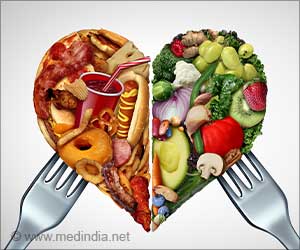Heart Healthy Diet is critical in maintaining cardiovascular health, revealing the impact of sodium, plant-based alternatives, and time-restricted eating on heart disease risk.

- Studies show that plant-based meat substitutes offer no clear heart health advantage over animal meat
- 89% of heart disease patients consume more than double the recommended daily sodium intake
- Intermittent fasting may increase the risk of cardiovascular death by up to 91%
Plant-Based Meat Analogs and Their Effects on Cardiometabolic Health: An 8-Week Randomized Controlled Trial Comparing Plant-Based Meat Analogs With Their Corresponding Animal-Based Foods
Go to source). But what truly constitutes a heart-healthy diet, and how can the right food choices help reduce the risk of heart disease? Recent nutrition studies have sparked fresh discussions on the role of certain foods in heart health, raising questions about which dietary habits are beneficial and which may do more harm than good.
High sodium intake is linked to a 91% higher risk of cardiovascular death! #hearthealth #medindia #diet’
Core Elements of a Heart-Healthy Diet
Two prominent nutrition studies drew attention to the critical role of diet in cardiovascular health. The first study, published in The American Journal of Clinical Nutrition, focused on 89 adults at risk for type 2 diabetes. Conducted by researchers from the Singapore Institute of Food and Biotechnology Innovation and the Agency for Science, Technology, and Research, it found that consuming plant-based meat substitutes did not provide significant heart health benefits compared to eating animal meat. This challenges the assumption that plant-based alternatives are inherently better for cardiovascular health.The second study, presented at the American College of Cardiology’s Annual Scientific Session, analyzed data from 3,170 adults with cardiovascular disease who participated in the National Health and Nutrition Examination Survey (NHANES) in the United States. The study revealed that 89% of participants consumed more than double the recommended daily sodium intake, which is 1,500 milligrams, as advised by the American Heart Association.
Foods to Avoid for Better Heart Health
So, what makes certain foods detrimental to heart health, regardless of whether they’re plant-based or not? One of the major culprits is sodium, commonly found in processed and fast foods. High sodium intake leads to elevated blood pressure, which strains the cardiovascular system and increases the risk of heart disease and stroke. It’s essential to limit the consumption of foods rich in sodium, such as canned soups, frozen meals, and snacks.Moreover, while plant-based diets are generally seen as healthier, not all plant-based products are created equal. Processed plant-based meats often contain high levels of sodium and unhealthy fats, which can counteract the benefits of a plant-based diet. Opting for whole, unprocessed plant foods, such as fruits, vegetables, whole grains, and legumes, is a better strategy for heart health.
Expert Insights on Heart-Healthy Eating
In a recent podcast episode of In Conversation, Prof. Oyinlola Oyebode, a public health expert from Queen Mary, University of London, shared her insights on heart-healthy diets. Prof. Oyebode, who specializes in behavioral risk factors for noncommunicable diseases, emphasized the importance of focusing on whole foods and maintaining a balanced diet rich in nutrients. She also highlighted the need for marginalized populations to have better access to nutritious foods, as they often face higher risks of heart disease due to limited resources and unhealthy food environments.
The Role of Salt in Cardiovascular Health
Sodium, commonly known as salt, plays a significant role in cardiovascular health. Excessive sodium intake can lead to high blood pressure, which is a major risk factor for heart disease. The American Heart Association recommends a daily sodium intake of no more than 1,500 milligrams, but most people consume far more than this.Intermittent Fasting: Good or Bad for Your Heart?
Intermittent fasting has gained popularity for its potential benefits, such as weight loss and improved blood sugar levels. However, its long-term impact on heart health remains uncertain. Some studies suggest that intermittent fasting can reduce cholesterol and blood pressure, both of which are key factors in heart disease prevention. Yet, a recent study presented at the EPI Lifestyle Scientific Sessions 2024 raised concerns. It found that eating within an 8-hour time window might increase the risk of cardiovascular death by 91%.Given that time-restricted eating is a relatively new area of research, experts caution against adopting such practices without fully understanding their long-term effects on the heart. As with any dietary change, it’s important to consult with healthcare professionals to ensure it aligns with individual health needs.
A heart-healthy diet goes beyond simply avoiding unhealthy foods. It’s about embracing a balanced, nutrient-rich eating plan that includes plenty of fruits, vegetables, whole grains, lean proteins, and healthy fats. While processed foods, high sodium, and unhealthy fats are the main dietary risks to heart health, incorporating wholesome, minimally processed foods can significantly lower the risk of cardiovascular disease.
Reference:
- Plant-Based Meat Analogs and Their Effects on Cardiometabolic Health: An 8-Week Randomized Controlled Trial Comparing Plant-Based Meat Analogs With Their Corresponding Animal-Based Foods - (https://www.sciencedirect.com/science/article/pii/S0002916524003964)
Source-Medindia









